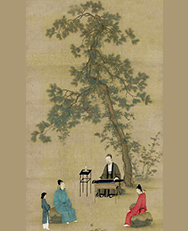Scholar-officials of China

FILE PHOTO: “Listening to the Qin”by Emperor Huizong of Song (1082–1135)
Shi Dafu, which is commonly translated as scholar-official, originally involved two different social classes.
Confucius believed that those who were loyal to the ruler of the nation, loved their country, and held themselves to high standards could be called “Shi.” Confucianism, which advocates living and behaving according to moral principles, became the orthodox ideology for state governance in the Han Dynasty. Legalism, with its emphasis on “strict laws and harsh punishments,” guaranteed the implementation of the Confucian ideological system. The combination of the two philosophies resulted in the establishment of an exceptionally effective mechanism for ruling the country. The Shi ultimately adopted Confucian-Legalist philosophy as their mainstream ideology. They spread their academic ideas and strategies for governance everywhere, gradually forming a distinct social class that was eventually absorbed by the ruling elite.
Originally, the Dafu were individuals from the aristocracy who served as officers and occupied a higher social class than the Shi. The Warring States Period was an era of ambition, where individuals from all social classes pursued their aspirations. Among the Dafu class, many rose to prominence from the Shi class after achieving success. They didn’t rely on kinship resources and hereditary titles, thus forming a new class: “scholar-officials.”
The cultural accomplishments of the scholar-official class determined their social status and intellectual depth. They comprised the elite class of imperial China, characterized by their extensive education, especially in literature and the arts, including calligraphy and Confucian texts. Driven by ambition to excel in self-cultivation and national development, scholar-officials dominated state governance and local affairs in imperial China.
Edited by REN GUANHONG

 PRINT
PRINT CLOSE
CLOSE